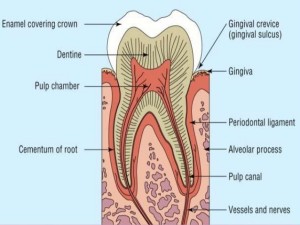Ever wonder why your teeth are strong? Why they can’t be easily damaged? And why most doctors and dental professionals considered this the strongest part of the body? One of the reasons is cementum.
Cementum is a hard tissue. This provides a strong grip to the periodontal ligament towards your teeth. As it slowly forms overtime, cementum is attached to the periodontal ligament.
As outlined by research, cementum is made from cementoblasts. This builds hard and calcified layers of tissues that can cover the root of your teeth. Cementum has two sides: the outer and inner. The inner cementum is attached to your dentin; while the outer is attached to the periodontal ligament. Aside from alveolar bone, cementum keeps the teeth in place, just like how it keeps your periodontal ligament attached to your teeth.
As expressed above, cementum forms over time. This is due to created cementoblasts which are excreted by your teeth. Dentists believed that cementum is softer than dentin. It comes in yellow shade and is made from chemicals that mimic the characteristics of a human bone. However, cementum is avascular. Therefore, it isn’t supported by blood vessels and is proved to be in three types: the acellular, cellular and afibrillar cementum.
Acellular cementum has small cellular components that cover 1/3-1/2 of your tooth. The cellular cementum, on the contrary, is permeable that covers the apex by 1/3-1/2 of your tooth. Last is afibrillar cementum that covers your tooth enamel.
Since cementum keeps the periodontal ligament attached to your teeth, it is prone to periodontal disease. With this, it pays to fight or resolve the potential risk of this problem.
The infamous scaling and root planing procedure is one of the most effective solutions to fight and combat periodontal disease. This removes the diseased cementum and eradicates dental calculus. If your dentin is likewise infected, your dentist will remove it, too. The reason is to keep gum inflammation at bay. Research shows, this non-surgical dental procedure is also known as deep cleaning. And just like other therapies, it comes with adverse effects.
Based on research, scaling and root planing procedure induces harmful bacteria. It can go to the bloodstream that can affect the gum tissues. Luckily, you can use antibiotics to prevent this. These medications should be taken before and after the procedure. Antibiotics are not advised to those with heart problems. The very reason is to avoid complications that might cause heart infection.
Indeed, SRP treatment is one efficient solution. This works very well in stopping gum disease. However, never forget the use of dental care. Always brush and floss your teeth on a daily basis. The deed fights dental plaques and prevents the potential risks of gum disease.
Needless to say, don’t forget to avoid bad oral habits. Unhealthy habits, like excessive smoking and chewing tobacco highly promote gum disorder which might cause your cementum to deteriorate.
To fully ensure your cementum, consult a dentist twice per year or consider dental 24 hour service. Dental checkup is extremely useful especially in detecting dental problems, like gum disease.